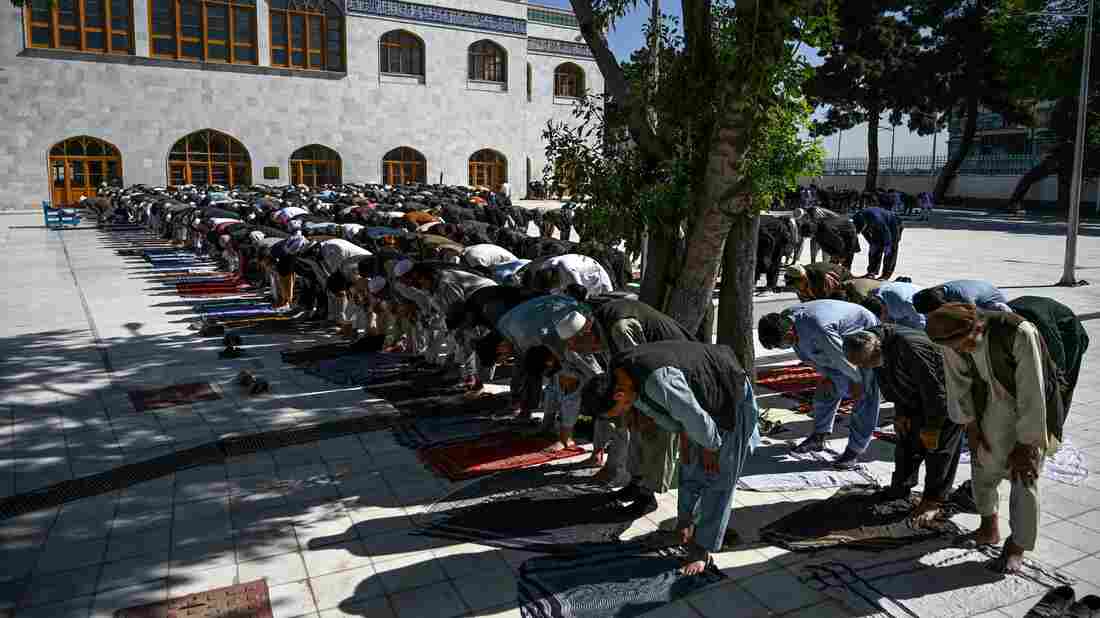
Muslim worshipers in Kabul offer prayers Sunday at the start of Eid al-Fitr, which marks the end of the Muslim holy month of Ramadan. The Taliban announced a three-day ceasefire during the holiday, a surprising move after months of bloody fighting. Wakil Kohsar/AFP via Getty Images hide caption
Since the U.S. and the Taliban agreed to a deal that American officials applauded as a path to peace, Afghanistan has endured months of anything but. The spring has brought bloodshed, acrimony and few signs that the Afghan government and the Islamist militant group were any closer to reconciliation — until Sunday.
That glimmer of hope arrived with the first day of the Eid al-Fitr holiday, commemorating the end of the holy month of Ramadan, when the Taliban unilaterally declared a three-day cease-fire beginning Sunday. Shortly afterward, Afghan President Ashraf Ghani announced that the government had accepted the truce proposal and was initiating a process to release up to 2,000 Taliban prisoners.
The prisoner release is a "good will gesture" carried out specifically in response to the Taliban's decision, according to presidential spokesperson Sediq Sediqqi. Ghani's government "is extending the offer of peace and is taking further steps to ensure success of the peace process," Sediqqi tweeted Sunday.
Ghani said he also received a call from U.S. Secretary of State Mike Pompeo, expressing gratitude and reiterating the American push for a longer cease-fire and the start of direct negotiations between Afghanistan and the Taliban. So far, those talks have faltered because of disagreements over how and when to carry out the prisoner swaps proposed in the U.S.-Taliban agreement.
That deal, announced in late February, calls for Afghanistan to release 5,000 prisoners and the Taliban to release up to 1,000 Afghan soldiers as a prelude to peace negotiations.
"Peace is the consistent and overwhelming desire of the Afghan people," Pompeo said in a statement welcoming the cease-fire Sunday. "We hope this ceasefire can build trust. Next, all sides should work together to build on the momentum of this historic Eid ceasefire to move with urgency to intra-Afghan negotiations."
Still, such negotiations might not come easily. The nearly three months since the U.S.-Taliban announcement has seen a spasm of violence in Afghanistan, much of it carried out by Taliban insurgents against Afghan soldiers. Other Islamist militant groups active in the country — such as the Islamic State and al-Qaida, with whom the Taliban pledged to sever ties — have claimed responsibility for a slew of other attacks. The U.S. blamed ISIS for one particularly gruesome assault on a maternity ward at a Kabul hospital two weeks ago.
Also hindering the proposed peace process was a dispute between Ghani and his principal challenger for the presidency, Abdullah Abdullah. The rivals settled their spat earlier this month with a power-sharing agreement, which positioned Abdullah as leader of the peace talks with the Taliban.
"Peace is the priority of the people of Afghanistan," Abdullah said after the Taliban announced its cease-fire, adding: "We welcome any positive step that helps us end the war, put an end to the long suffering of our nation & achieve a just & durable peace."
"in" - Google News
May 25, 2020 at 10:08PM
https://ift.tt/36qRwdd
3-Day Truce, Prisoner Release Deal Inspire Hopes For Reconciliation In Afghanistan - NPR
"in" - Google News
https://ift.tt/2MLa3Y1
https://ift.tt/2YrnuUx
Bagikan Berita Ini














0 Response to "3-Day Truce, Prisoner Release Deal Inspire Hopes For Reconciliation In Afghanistan - NPR"
Post a Comment